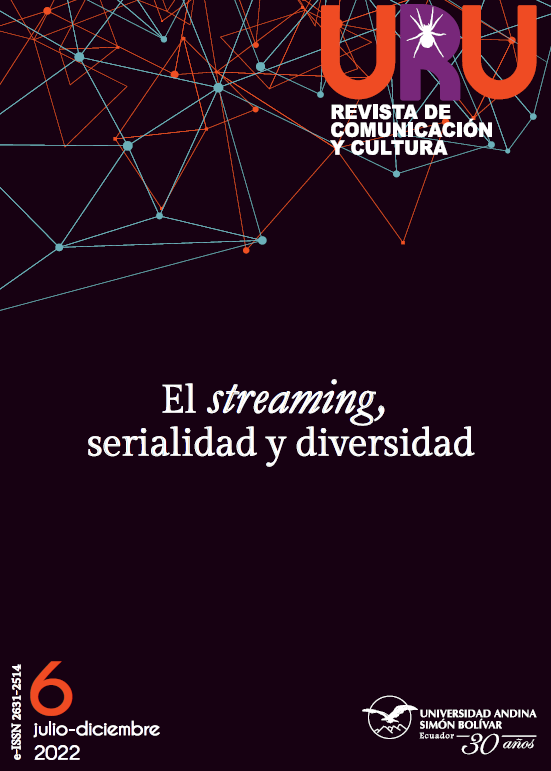The Fashion of Capitalism Dystopia in the Obese Contemporary Audiovisual Narrative Streaming: The Cruelty Language of Squid Game
DOI:
https://doi.org/10.32719/26312514.2022.6.5Keywords:
series, television, cinema, pornography,, cruelty, anticapitalism, communication, streamingAbstract
Torture porn, constant references to Italian Giallo or exploitation cinema, anti-capitalist messages, the dystopian fashion in audiovisual narratives and the popularisation and definitive settlement of streaming platforms due to the COVID-19 pandemic, have given rise to the establishment of a new fashion: the tendency of an audience to enjoy spectacularised cruelty disguised as political sermons. Far from trying to censor such works, the aim is to promote reflection that continues to induce a sense of cynicism and abandonment of the citizenry by their rulers, which the audiovisual entertainment industry seems to take advantage of by groping the sense of general disenchantment in the West. In the midst of this ecosystem appears the recent Netflix series The Squid Game, a festival of sadistic imagery with deep political overtones that brings together several of the aforementioned genres and thematic axes in a single product. Consequently, the main objective is to analyse the characteristics of the fashion for narratives of this type, through a content analysis of the series The Squid Game in order to inspect the elements that configure some key elements of mainstream entertainment via streaming. As a result, the plots are predictable and cold, but the audiovisual imagination is fresh and attractive, so that the anti-capitalist background is perceived in the background.
Downloads
References
Agrawal, Shikhar. 2021. “‘Squid Game’ Season 1: Ending, Explained – Who Was Il-Nam? Why Mastermind Created the Game?”. Digital Mafia Talkies. 19 de septiembre.
Aguirre, Carlos. 2012. “Walter Benjamin, el cine y el futuro del arte”. Revista Izquierdas 12: 143-63.
Andréu, Jaime. 2002. Las técnicas de análisis de contenido: Una revisión actualizada. Sevilla: Fundación Centro Estudios Andaluces.
Argullol, Rafael. 2007. El fin del mundo como obra de arte. Barcelona: Acantilado.
Aristóteles. 2015. Poética. Madrid: Alianza Editorial.
Artaud, Antonin. 2011. El teatro y su doble. Barcelona: Edhasa.
Barthes, Roland. 1986. “Saliendo del cine”. Cuadernos de Cine 7: 63-73.
Bazin, André. 1977. El cine de la crueldad. Bilbao, ES: Mensajero.
Benchichah, Noor. 2015. “La tercera edad dorada de la televisión: ‘Battlestar Galáctica’ y las nuevas formas de pensar, hacer y consumir el drama televisivo norteamericano”. Tesis doctoral, Universitat Ramon Llull, España.
Benjamin, Walter. 2003. La obra de arte en la época de su reproductibilidad técnica. Ciudad de México: Ítaca.
Benjamin, Walter.. 2008. El narrador. Santiago de Chile: Metales Pesados.
Bettelheim, Bruno. 2019. Psicoanálisis de los cuentos de hadas. Barcelona: Booket.
Brown, Steven. 2018. Japanese Horror and the Transnational Cinema of Sensations. Cham, CH: Palgrave Macmillan. DOI: https://doi.org/10.1007/978-3-319-70629-0
Campbell, Joseph. 1972. El héroe de las mil caras: Psicoanálisis del mito. Ciudad de México: Fondo de Cultura Económica.
Cascajosa, Concepción. 2005. “Por un drama de calidad en televisión: La segunda edad dorada de la televisión norteamericana”. Comunicar 25: 339-41. https://doi.org/10.3916/C25-2005-157. DOI: https://doi.org/10.3916/C25-2005-157
Castillo, Bárbara, Carlos Fernández, y Luis Romero. 2021. “Crueldad como lenguaje transformador: Del teatro de Antonin Artaud al cine moderno de André Bazin”. Revista de Ciencias Sociales 3 (27): 55-71. https://doi.org/10.31876/rcs.v27i3.36757. DOI: https://doi.org/10.31876/rcs.v27i3.36757
Castro Flórez, Fernando. 2019. Estética de la crueldad: Enmarcados artísticos en tiempo desquiciado. Madrid: Fórcola.
Deleuze, Gilles. 1983. La imagen-movimiento: Estudios sobre cine 1. Barcelona: Paidós.
Delgado, Diego. 2021. “Yo, yo misma y mi autoexplotación”. Guía del ocio. Accedido 24 de octubre.
Dumoulié, Camille. 1996. Nietzsche y Artaud: Por una ética de la crueldad. Ciudad de México: Siglo XXI.
Edelstein, David. 2006. “Now Playing at Your Local Multiplex: Torture Porn”. New York. 26 de enero.
Etherington, Darrell. 2014. “Monument Valley Is a Legend in the Making You Must Play Now”. Tech Crunch. 3 de abril.
Fernández, Carlos, y Luis Romero. 2021. Cine de la crueldad y cultura mainstream contemporánea: La pornografía del horror en la tercera edad dorada de la televisión a través del caso de las series “Years and Years” y “Chernobyl”. Madrid: Sindéresis.
Fotogramas. 2014. “‘True Detective’: Pizzolatto, acusado de plagio, habla de la tercera temporada”. Fotogramas. 7 de agosto.
Fukuyama, Francis. 1993. El fin de la historia y el último hombre. Barcelona: Planeta.
García, Concha. 2021. “De Dalí a Escher: las referencias artísticas de ‘El juego del calamar’”. La Razón. 21 de octubre.
Geekzilla. 2021. “¿Por qué todo el mundo está hablando de ‘El juego del calamar’?”. Geekzilla. 24 de septiembre.
Han, Byung-Chul. 2016. Topología de la violencia. Barcelona: Herder.
Hernández, Sergio. 2008. “La distopía y ‘Nosotros’”. En Nosotros, de Evgueni Zamiatin, 14-29. Madrid: Akal.
Imbert, Gerard. 2019. Crisis de valores en el cine posmoderno. Madrid: Cátedra.
Iriondo, Mikel. 2019. “Cine y violencia política: La representación del dolor ajeno”. Revista Internacional de Filosofía 47: 27-47.
Martin, Brett. 2014. Hombres fuera de serie. Barcelona: Ariel.
McCausland. Elisa. 2017. “Distopías juveniles del siglo XXI: Pan, circo y autoexplotación”. En Distopía y cine: Futuro(s) imperfecto(s), coordinado por Antonio José Navarro, 107-15. San Sebastián, ES: Filmoteca de Navarra.
Netflix [@netflix]. 2021. “Squid Game has officially reached 111 million fans — making it our biggest series launch ever!” [tuit]. 12 de octubre.
Nietzsche. Friedrich. 2019. El nacimiento de la tragedia. Madrid: Alianza Editorial.
Ovejero, José. 2012. La ética de la crueldad. Barcelona: Anagrama.
Prieto, Belén. 2021. “‘El juego del calamar’ ya es la serie más vista de la historia de Netflix”. El Español. 13 de octubre.
Ramírez, Noelia. 2019. “El verano de la ‘teletortura’: ¿Las series de mal rollo son el nuevo porno televisivo?”. S Moda. 28 de junio
Reviriego, Carlos. 2011. “Amplitud de miras: Nueva(s) vida(s) para las series norteamericanas”. Cahiers du Cinéma: España 47: 6-8.
Ruiz de Samaniego, Alberto. 2015. Las horas bellas: Escritos sobre cine. Madrid: Abada.
Savater, Fernando. 2008. Misterio, emoción y riesgo: Sobre libros y películas de aventuras. Barcelona: Ariel.
Suzunaga, Juan Carlos. 2013. “Modernidad, crueldad y exclusión del sujeto o las contradanzas del discurso capitalista”. Desde el Jardín de Freud 13: 239-56.
Tocho T8. 2020. “Fritz Lang (1869-1976): ‘Metrópolis’ (1927) y ‘Babilonia’”. Tocho T8. 19 de marzo.
Tones, John. 2015. “14 obras de Escher que nunca nos cansamos de ver”. Verne. 15 de julio.
Van Arendonk, Kathryn. 2017. “13 Signs You’re Watching a ‘Prestige’ TV Show”. Vulture. 28 de marzo.
Vattimo, Gianni. 1994. El fin de la modernidad: Nihilismo y hermenéutica en la cultura posmoderna. Barcelona: Gedisa.
Wheatley, Helen. 2016. Spectacular Television: Exploring Televisual Pleasure. Nueva York: Bloomsbury Publishing. DOI: https://doi.org/10.5040/9781350988149
Zas Marcos, Mónica, y José Antonio Luna, 2021. “Libros, películas y videojuegos que alimentan la obsesión por ‘El juego del calamar’”. El Diario. 10 de octubre.
Downloads
Published
How to Cite
Issue
Section
License

This work is licensed under a Creative Commons Attribution-NonCommercial-ShareAlike 4.0 International License.
ASSIGNMENT OF RIGHTS, DECLARATION OF CONFLICT OF INTEREST AND DISSEMINATION
The authors who publish in this journal accept the following conditions:
- Authors retain copyright and grant the journal the right of first publication, with the work registered under the Creative Commons Attribution-NonCommercial-ShareAlike 4.0 License, which allows sharing, adapting and attributing the work (see: Open Access Policies).
- Authors can make other independent and additional contractual agreements for the distribution of the article published in this journal (e.g., include it in an institutional repository or publish it in a book) as long as they expressly indicate that the article was published for the first time in Uru: Revista de Comunicación y Cultura. In the case of reproduction, a note similar to the following must be included: This text was originally published in the journal Uru: Revista de Comunicación y Cultura N ° -, year of publication.
- Authors are encouraged to publish their work on the Internet (e.g. on institutional or personal pages) in the final version published by Uru: Revista de Comunicaicón y Cultura as it may lead to a wider and faster dissemination of the published work.








